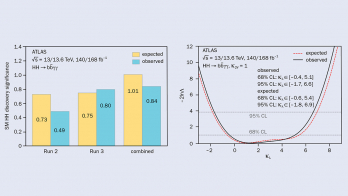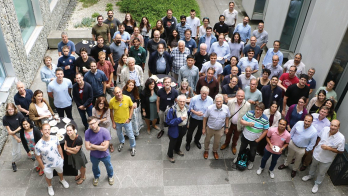
Marking 10 years since the discovery of the Higgs boson, a two-day workshop held at the University of Birmingham on 30 June and 1 July brought together ATLAS and CMS physicists who were involved in the discovery and subsequent characterisation of the Higgs boson. Around 75 physicists, in addition to members of the public who attended a colloquium, celebrated this momentous discovery together with PhD students, early-career researchers and members of IOP’s history of physics group. In an informal atmosphere, participants recalled and gave insights on what had taken place, spicing it with personal stories that placed the human dimension of science under the spotlight.
The story of the Higgs-boson search was traced from the times of LEP and the Tevatron. Participants were reminded of the uncertainty and excitement during the final days of LEP: the hints of an excess of events at around 115 GeV and the ensuing controversy surrounding the decision to either stop the machine or extend its data-taking further. For the Tevatron, the focus was more on the relentless race against time until the LHC could provide an overwhelming dataset. It was considered plausible that the Tevatron could observe the Higgs boson first, leading CERN to delay a scheduled break in LHC data-taking following its 2011 run.
The timeline of the design, construction and commissioning of the LHC experiments was presented, with a particular focus on the excellent performance achieved by ATLAS and CMS since the beginning of Run 1. The parallel role of theory and the collaboration among theorists and experimentalists was also discussed. Speakers from the experiments involved in the Higgs-discovery analyses provided personal perspectives on the events leading up to the 4 July 2012 announcement.
With his unique perspective, former CERN Director-General Chris Llewellyn-Smith described the early discussions and approval of the LHC project during a well-attended public symposium. He recalled his discussions with former UK prime minister Margaret Thatcher, the role of the ill-fated US Superconducting Super Collider and the “byzantine politics” that led to the LHC’s approval in 1994. Most importantly, he emphasised that the LHC was not inevitable: scientists had to fight to secure funding and bring it to reality. Former ATLAS spokesperson David Charlton reflected on the preparation of the experiments, the LHC startup in 2008 and subsequent magnet problems that delayed the physics runs until 2010, noting the excellent performance of the machine and detectors that enabled the discovery to be made much earlier than expected.
The workshop would not have been complete without a discussion on what happened after the discovery. Precision measurements of the Higgs-boson couplings, observation of new decay and production modes, as well as the search for Higgs-boson pair-production were described, always with a focus on the challenges that needed to be overcome. The workshop closed with a look to the future, both in terms of experimental prospects of the High-Luminosity LHC and theory.







